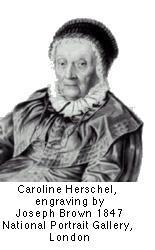Caroline Lucretia Herschel
Astronomer; b. 16 March 1750 (Hannover, Hanover [Germany]), d. 9 January 1848 (Hannover.
 Caroline Herschel was the daughter of an army musician with the Hanoverian Guards. Until the age of 22 she assisted her mother in managing the household. In 1722 her brother William invited her to join his music business in England, and Caroline began a successful career as a singer.
Caroline Herschel was the daughter of an army musician with the Hanoverian Guards. Until the age of 22 she assisted her mother in managing the household. In 1722 her brother William invited her to join his music business in England, and Caroline began a successful career as a singer.
William Herschel was an avid amateur astronomer, and Caroline soon shared his interest. When her brother was appointed court astronomer in 1782, Caroline and William gave their last concert performance and then turned to astronomy as their full-time profession.
Most of the astronomical work of Caroline Herschel related to her brother's observations. While running William's household she worked on the laborious mathematical calculations required to produce the new tables of objects in the sky. But she also made her own observations with a small Newtonian reflector telescope and between 1786 and 1797 discovered eight comets. In 1787 king George III granted her an annual pension of £50 as assistant to the court astronomer.
In 1798 Caroline Herschel presented a catalogue of 560 stars that were missing in the British Catalogue and a list of errata to the Royal Society. After her brother's death in 1822 she returned to Hannover, where she completed and published a catalogue of 2500 nebulae and star clusters. In 1828, at the age of 77, she was awarded the gold medal by the Astronomical Society for her work. She enjoyed the admiration and respect of science and the general public until her death at the age of 97.
References
Caroline Lucretia Herschel. Encyclopaedia Britannica 15th ed. (1995).
European Space Agency (2004), Revealing the invisible: Caroline and William Herschel.
http://www.esa.int/export/esaSC/SEM8600P4HD_people_0.html (accessed 24 September 2004).
Taylor, P. and S. Saey (2004), Friedrich Wilhelm Herschel.
http://www.astroleague.org/al/obsclubs/herschel/fwhershs.html (accessed 24 September 2004).
home
 Caroline Herschel was the daughter of an army musician with the Hanoverian Guards. Until the age of 22 she assisted her mother in managing the household. In 1722 her brother William invited her to join his music business in England, and Caroline began a successful career as a singer.
Caroline Herschel was the daughter of an army musician with the Hanoverian Guards. Until the age of 22 she assisted her mother in managing the household. In 1722 her brother William invited her to join his music business in England, and Caroline began a successful career as a singer.